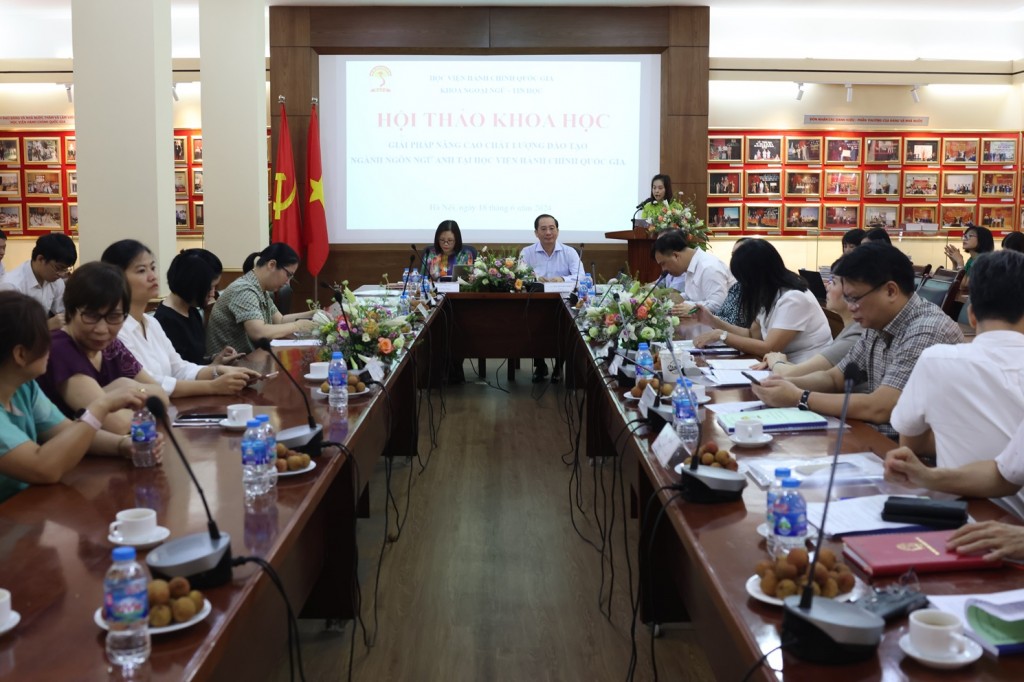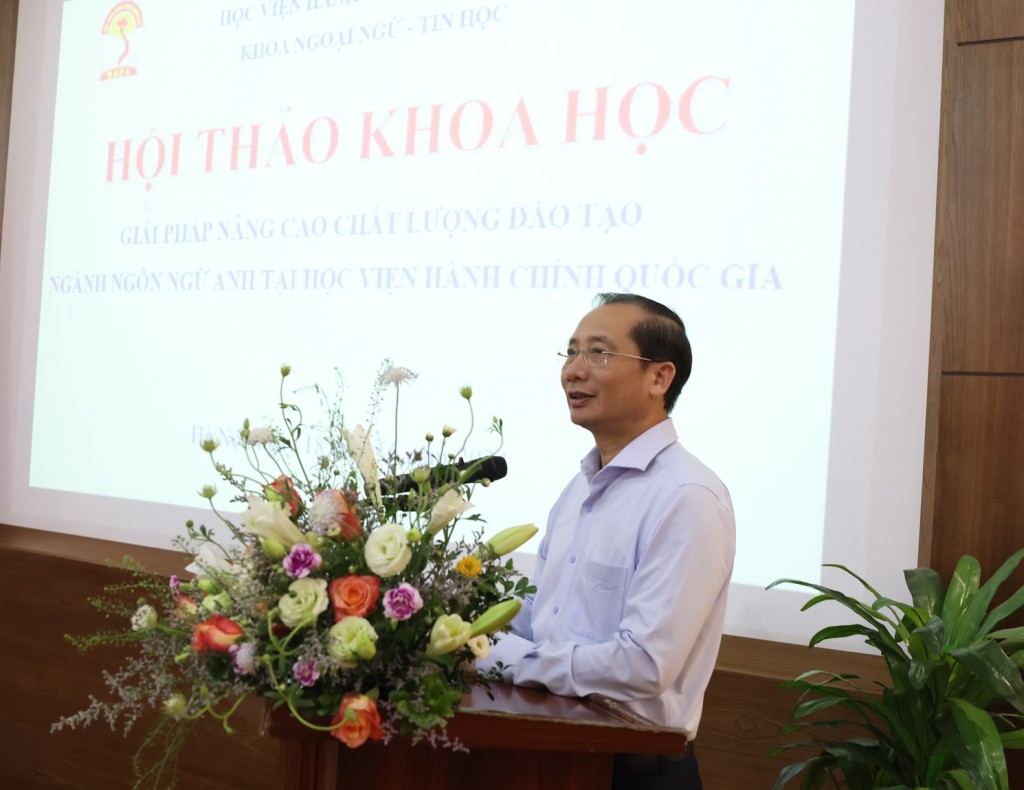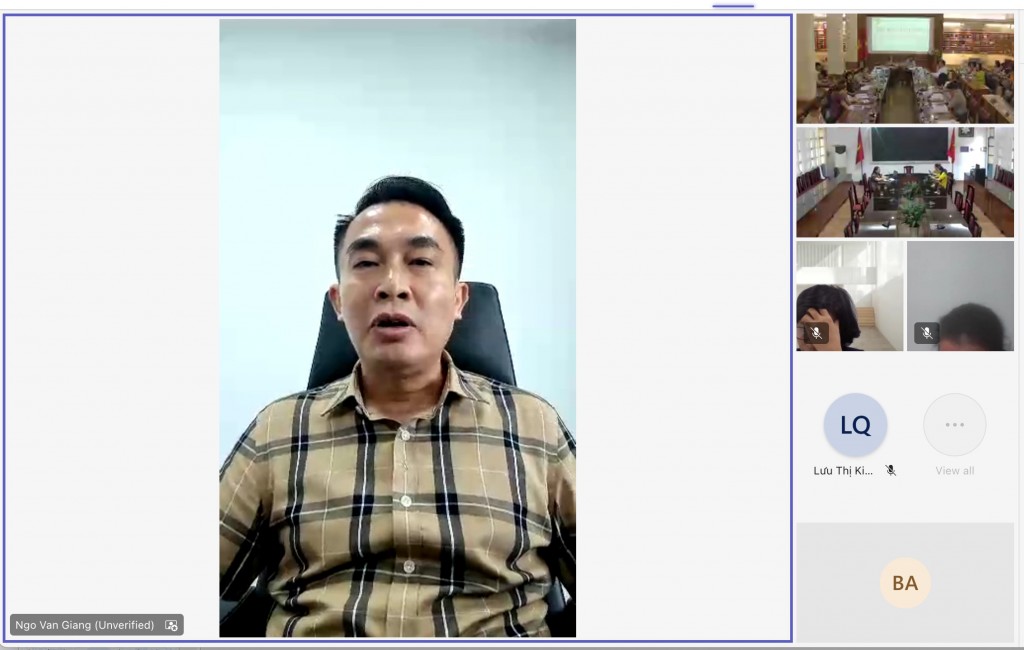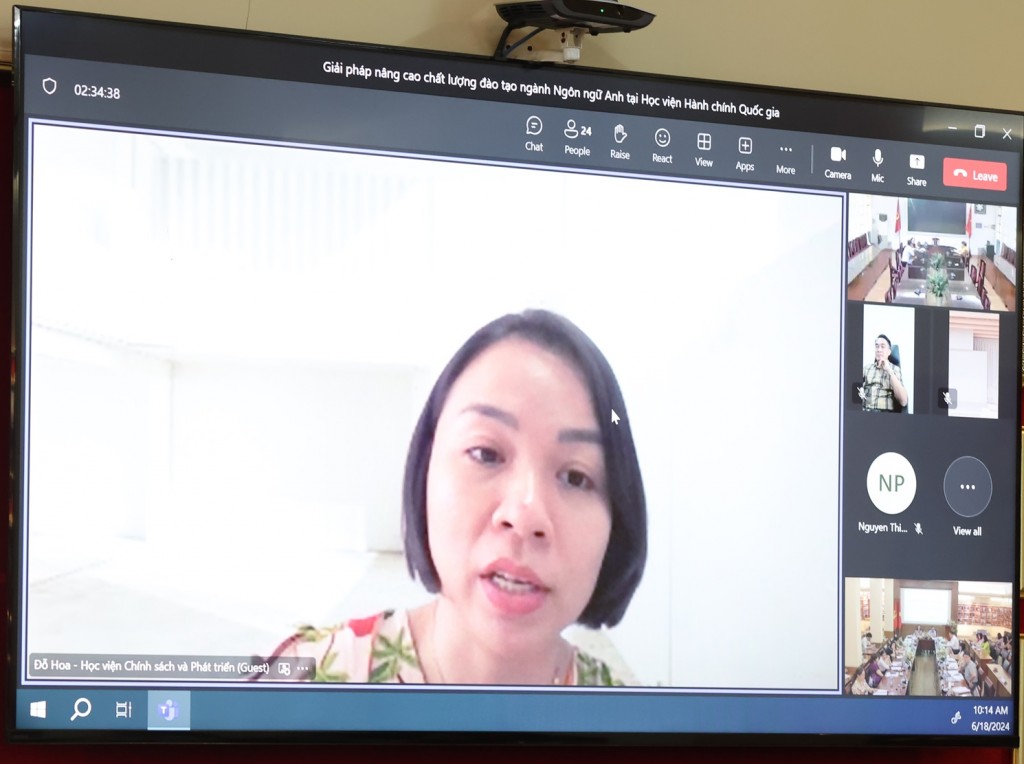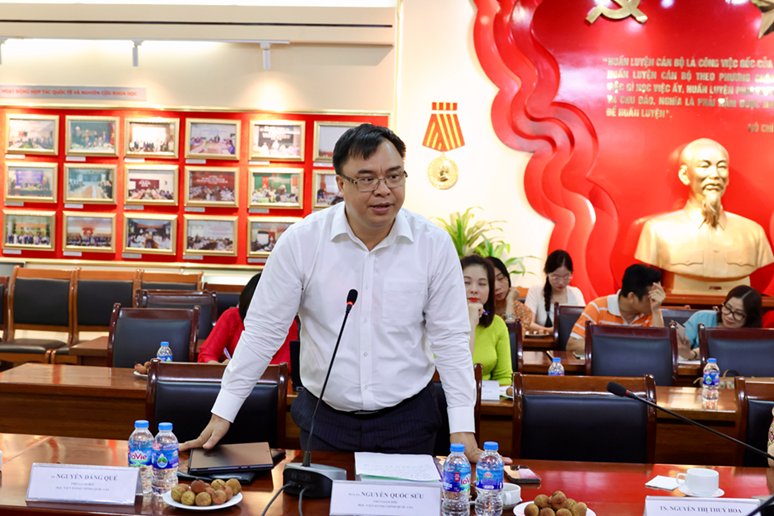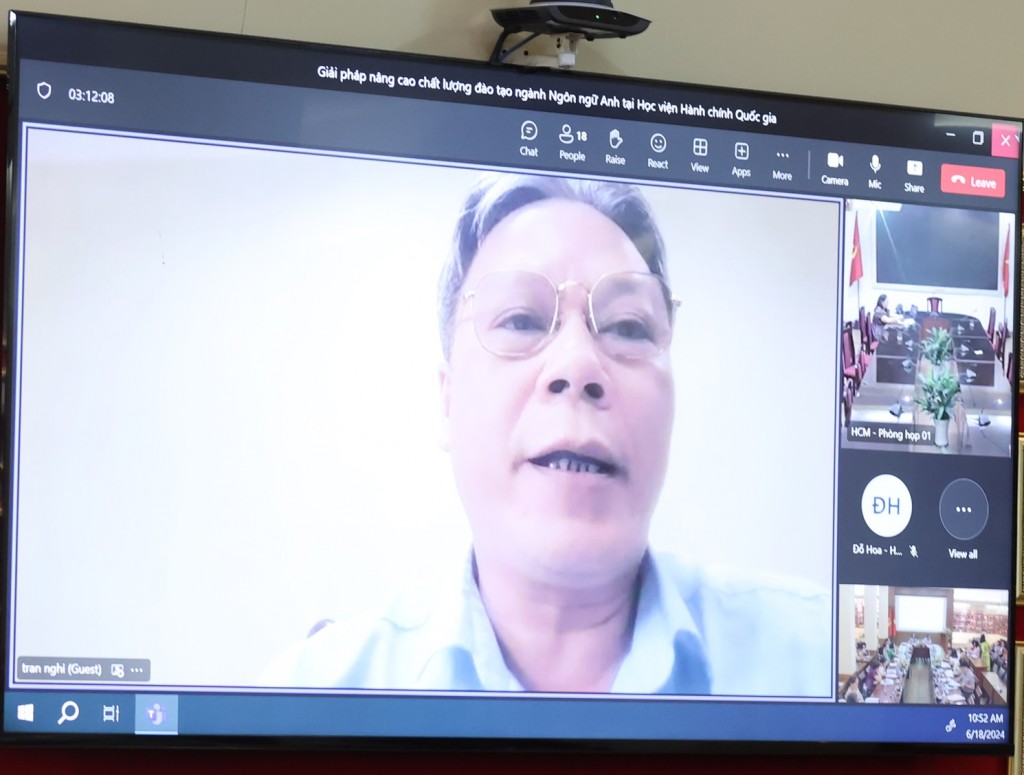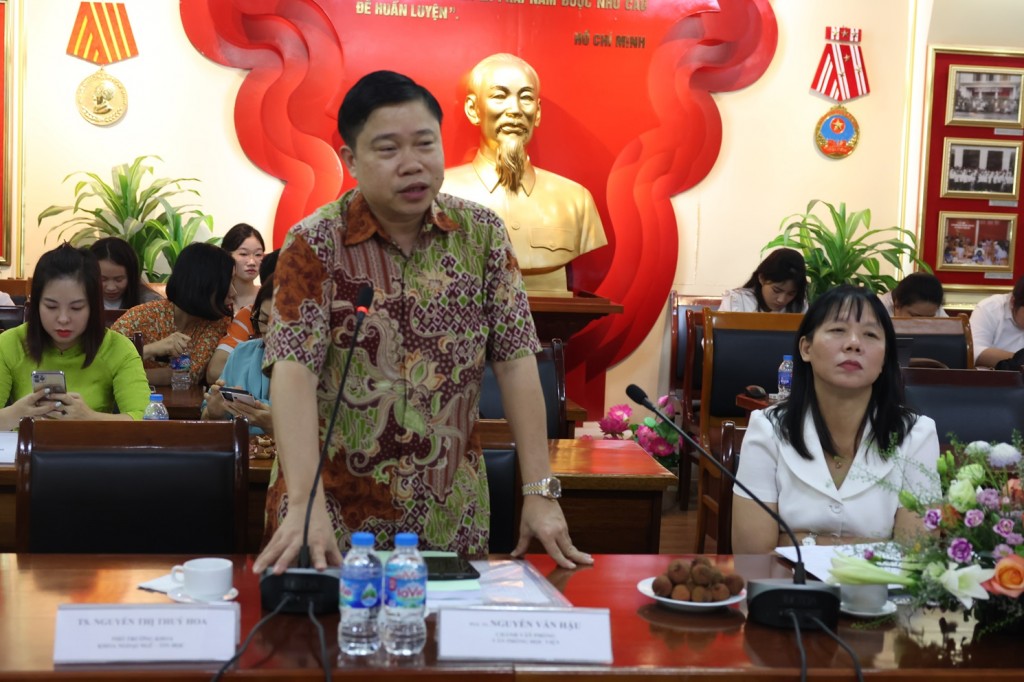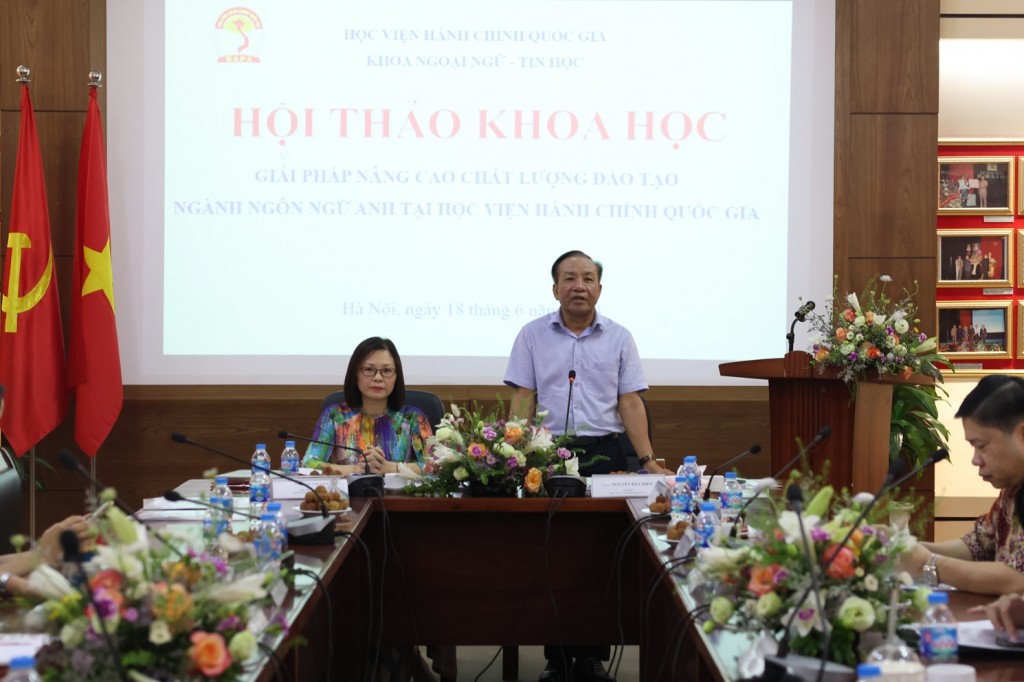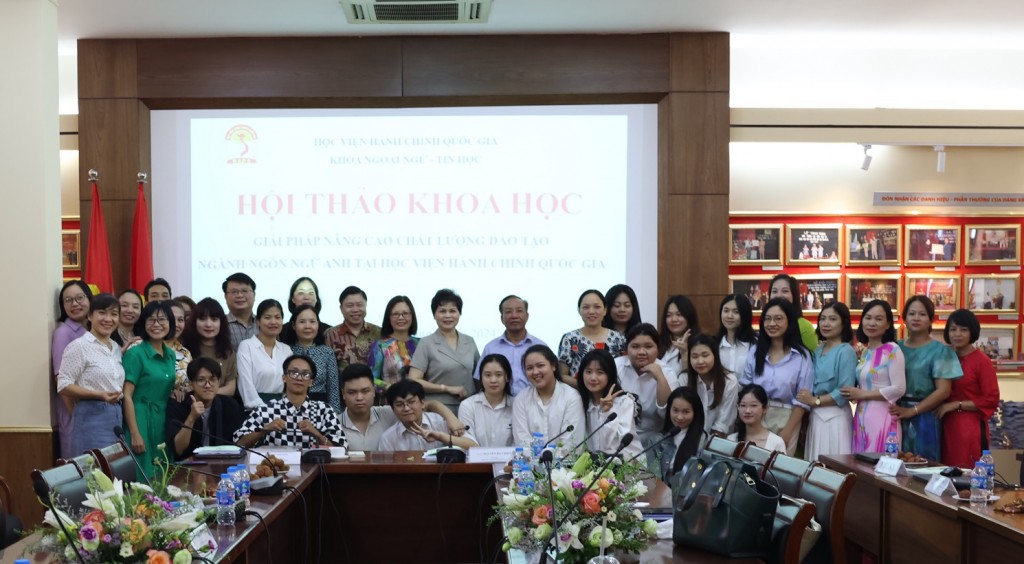On June 18, 2024, at NAPA Headquarters in Hanoi, the National Academy of Public Administration (NAPA) organized a workshop on ” Solutions to Improve the Training Quality of the English Language Major at NAPA.” Assoc. Prof. Dr. Nguyen Ba Chien, NAPA President, and Dr. Giap Thi Yen, Deputy Dean of the Faculty of Foreign Language and Information Technology Studies, co-chaired the workshop.
Attending the workshop were guests from the following institutions: Academy of Policy and Development; Faculty of Foreign Languages, Academy of Journalism and Communication; Faculty of Business English, Thuongmai University; State Organization Journal, Ministry of Home Affairs (MoHA); Center for Foreign Languages and Educational Cooperation, University of Social Sciences and Humanities, Viet Nam National University (VNU), Ha Noi.
On the side of NAPA, there were Dr. Nguyen Dang Que, NAPA Vice President; Assoc. Prof. Dr. Nguyen Quoc Suu, NAPA Vice President; Assoc. Prof. Dr. Luong Thanh Cuong, NAPA Vice President (attending online); leaders of various NAPA departments and faculties.
From the Faculty of Foreign Language and Information Technology Studies of NAPA, there were Deputy Deans Dr. Nguyen Thi Thuy Hoa and Dr. Giap Thi Yen; faculty members, staff, and students from the Faculty.
The workshop was held in both in-person and online formats.
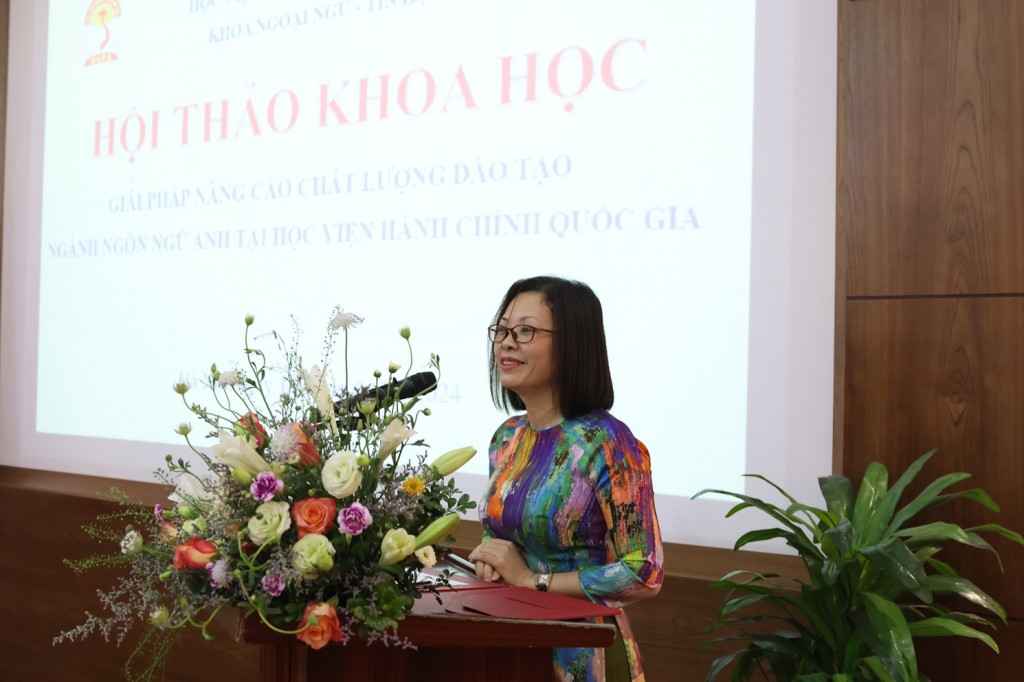
Dr. Giap Thi Yen, Deputy Dean of the Faculty of Foreign Language and Information Technology Studies, NAPA, at the workshop.
In her opening remarks, Dr. Giap Thi Yen, Deputy Dean of the Faculty of Foreign Language and Information Technology Studies, expressed her gratitude to the experts both within and outside NAPA for their interest, participation, and contributions to the workshop. She highlighted the valuable opportunity for the Faculty to listen to the experts’ experiences and find effective solutions to enhance the training quality of the English Language major, contributing to the NAPA development progress.
Dr. Giap Thi Yen hopes that the workshop will receive opinions from the delegates on the following topics: (1) Theoretical issues on improving the training quality of the English language major; (2) Advantages and difficulties in the practical teaching of the English language training modules at NAPA; (3) Solutions to enhance the training quality of the English language major at NAPA; (4) Tools to support the improvement of the English language training quality; (5) The role of cooperation and linkage with domestic and international training institutions in improving the training quality of the English language major; (6) Training in the English language major to meet societal demands and other related topics.
In his remarks, Assoc. Prof. Dr. Nguyen Ba Chien, NAPA President, appreciated the meticulous and thorough preparation of the Faculty of Foreign Language and Information Technology Studies for the workshop. He affirmed that this workshop is essential and significantly meaningful for improving the quality of training of the Faculty specifically and NAPA in general. Given the general trend of higher education training both domestically and internationally, enhancing training quality is an objective necessity. At NAPA, the overall improvement of training quality has been and is being particularly emphasized. The English language program at the NAPA is a relatively new program but closely and integrally connected with other training programs at NAPA. Enhancing the quality of the English language program will improve the quality of other training programs. With the general development of society and technology, training methods are rapidly changing. We will fall behind if we do not keep up with the general trends in technological advancements and changes in mindset and training methods. In this context, the need to change and improve the quality of training in general, and the English language program in particular, is crucial. If English language majors at NAPA, with the advantage of English for public service, pursue a dual degree program, they will have a solid foundation in language and acquire in-depth knowledge in other fields. This will significantly broaden their job opportunities upon graduation.
Assoc. Prof. Dr. Nguyen Ba Chien expressed his desire to receive opinions not only on the issues sent to the delegates but also hopes for deeper sharing on solutions for changing the training program, enhancing the quality of the teaching staff not only in terms of knowledge but also skills and methods, and fostering cooperation between institutions, both domestically and internationally.
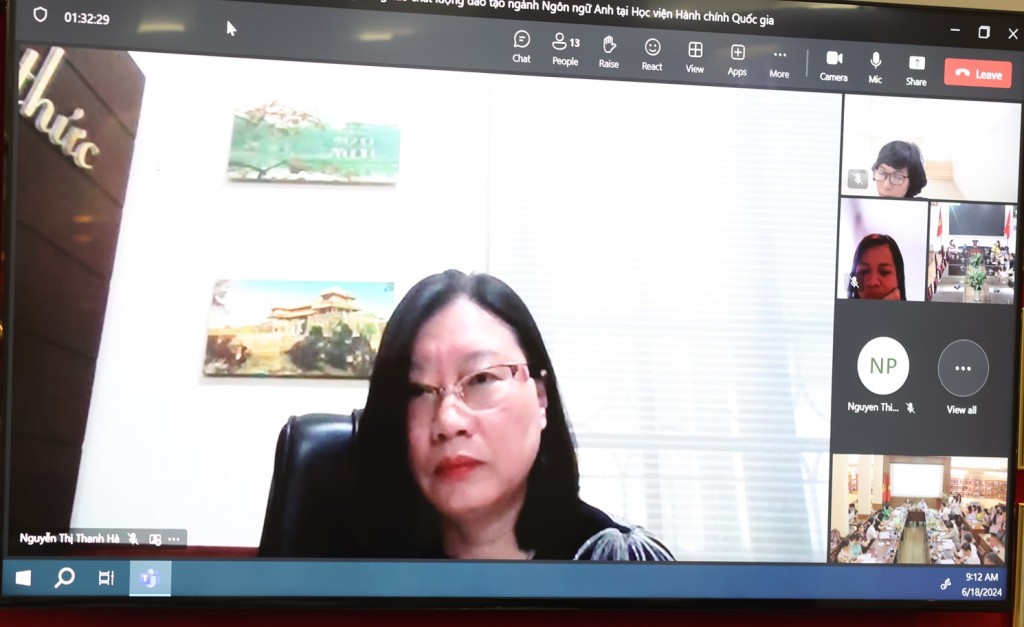
Ms. Nguyen Thi Thanh Ha, Director of the Center for Foreign Languages and Educational Cooperation, VNU University of Social Sciences and Humanities.
In the presentation “Some fundamental issues in managing the English language training program at universities,” Ms. Nguyen Thi Thanh Ha, Director of the Center for Foreign Languages and Educational Cooperation, VNU University of Social Sciences and Humanities, discussed that the management of university training is a form of management that, according to management science requirements, aligns with the training objectives and goals. It involves the influence of management entities on the training process (carried out by a collective of staff, lecturers, and students, with the strong support of other agents) to shape and develop the personality, qualities, and capabilities of students according to the training goals of the institution. Based on this, she addressed the fundamental aspects of managing university training, including the management of curriculum development, teaching and learning approach management, student performance assessment management, teaching staff management, student and academic support activity management, and the management of facilities and equipment for training.
According to her, the basic issues and contents of managing English language majors at universities need to be properly understood and effectively implemented. It is necessary to raise awareness among leaders, staff, lecturers, employees, and students about the importance of English language training and the necessity and basic content of managing it. This would create consensus, motivation, and determination to improve the training quality of the English language major at universities. With a proper understanding of the importance, purpose, requirements, and content of the English language major, each individual and unit, according to their functions and duties, will uphold their sense of responsibility and perform their tasks with quality and efficiency, thereby best meeting the training objectives of the English language program at universities.
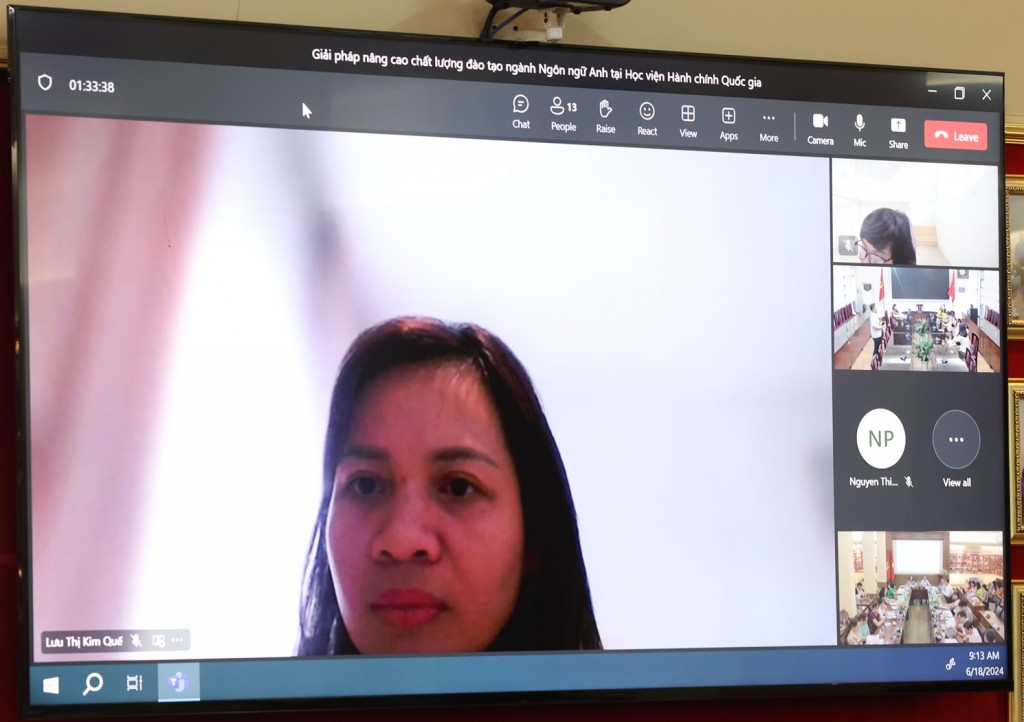
Ms. Luu Thi Kim Que, Faculty of Foreign Language and Information Technology Studies, NAPA, at the workshop.
In her presentation at the workshop, Ms. Luu Thi Kim Que shared the topic “The role of cooperation and linkage between educational institutions in enhancing the training quality of the English language major at NAPA”. According to her, in the era of globalization, cooperation between domestic and international educational institutions has become a crucial factor in improving the training quality of the English language major. Such collaboration not only helps educational institutions optimize resources and enhance teaching and research quality but also provides opportunities for lecturers and students to experience different teaching methods, thereby developing skills and critical thinking. International cooperation offers practical benefits, from faculty and student exchanges to joint research projects and organizing international workshops.
She proposed various models of training linkage and international cooperation with educational institutions both domestically and internationally, including faculty and student exchange programs, research collaboration, joint training program models, cooperation in educational technology, and organizing international workshops and conferences.
To optimize the effectiveness of these cooperation models, Ms. Luu Thi Kim Que suggested that NAPA needs to confront and overcome existing challenges, from strategic planning, human resources, finance, project management, technology infrastructure development, to curriculum synchronization and ensuring training quality. By continuously innovating and improving, NAPA will continue to affirm its role in developing the English language training program and contribute to the sustainable development of society in the context of globalization.
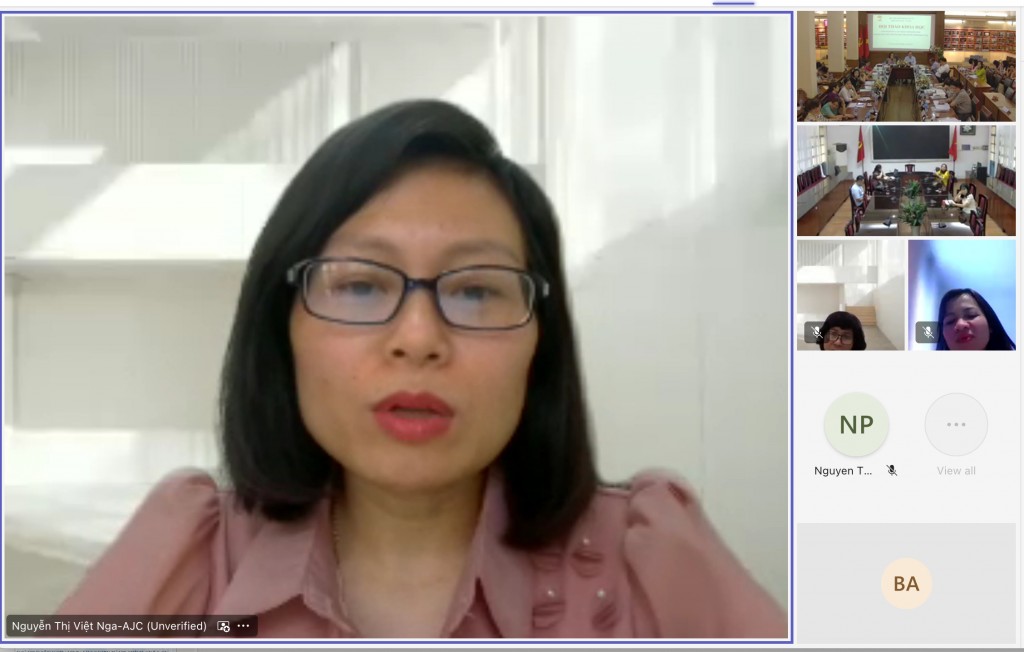
Dr. Nguyen Thi Viet Nga, Dean of the Faculty of Foreign Languages, Academy of Journalism and Communication, at the workshop.
Dr. Nguyen Thi Viet Nga, Dean of the Faculty of Foreign Languages, Academy of Journalism and Communication, shared the presentation titled “Several solutions to enhance career orientation for English language students in Viet Nam today.” She emphasized the crucial importance of career orientation for students. Career guidance not only helps students choose the right path but also equips them with the necessary skills and knowledge to succeed in their careers. Without career support and advice on selecting suitable professions, this issue can negatively impact the economy and the stability and development of each nation worldwide.
The English Language major has long been popular, attracting a large number of Vietnamese students. The English Language major, in particular, and foreign language training programs, in general, are always considered promising due to the high demand for foreign language human resources and the diverse job opportunities available, such as translators/interpreters, language teachers, office workers, tour guides, flight attendants, marketing staff, import-export personnel, and more. Such diverse and extensive job opportunities also challenge universities in defining specific career orientations when designing training programs and choosing approaches to help students meet employers’ requirements while maintaining the mission, vision, and educational philosophy of each institution.
Dr. Nguyen Thi Viet Nga proposed several solutions to enhance career orientation for English Language students, including (1) Increasing students’ knowledge and awareness of the importance of career guidance activities while still in university; (2) Enhancing the participation of employers in the training process; (3) Designing an education program that focuses on students and increases on-the-job practices; (4) Diversifying teaching and learning activities and assessments with a career-oriented approach; (5) Increasing extracurricular activities and exchange programs.
According to Mr. Ngo Van Giang, changes in the training context, the development trends in science and technology, the job market, etc., lead to changes in training models and methods, especially in English language training. The Academy of Policy and Development (APD) under the Ministry of Planning and Investment recognizes that many economic sectors are closely related to English. To improve the quality of English language teaching, APD has arranged for students to gain real-world experience at enterprises and invited experts to share their knowledge. Particularly, in response to the demands of innovation and digital transformation in teaching and learning, where foreign languages play a pioneering role, APD has identified that English training in the university environment should help students define clear output standards to meet job requirements. Additionally, the content and teaching methods should be adapted to the changes brought about by scientific and technological developments.
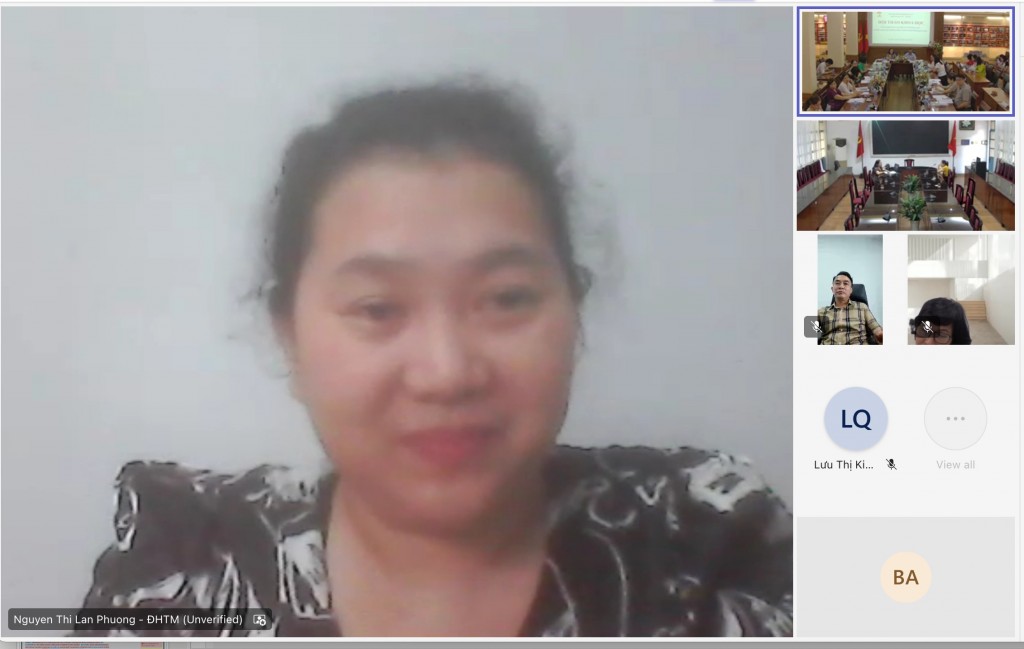
Dr. Nguyen Lan Phuong, Dean of the Faculty of Business English, Thuongmai University (TMU), at the workshop.
Sharing experiences on the linkage between training institutions and businesses to improve the quality of education, Dr. Nguyen Lan Phuong noted that there is currently a significant gap between theory and practice. Students are equipped with extensive knowledge and skills, but their readiness to enter the labor market is not high, demonstrating a gap between theoretical training and practical application. The linkage between educational institutions and businesses also helps design and adjust training programs to meet the expectations of enterprises. Dr. Nguyen Lan Phuong shared some experiences from TMU in innovating teaching methods, such as requiring some courses in the curriculum to involve real-world speakers who are experts currently working in businesses; organizing regular field trips for students each semester to businesses that have signed training cooperation agreements with TMU, helping students shape their future career opportunities; and holding talk shows where speakers share relevant topics with students, such as how to write a CV, effective job interview techniques, and methods in the translation and interpretation profession.
At the workshop, Dr. Do Thi Hoa, Head of the Division of Foreign Languages, APD, shared the advantages, challenges, and experiences in enhancing the training quality of the English language program at APD. The difference between the English language program at APD and other universities is that it focuses on economic and business English. This program easily recruits students, offers wide job opportunities, and has career orientations related to positions such as secretaries or assistant managers in enterprises and import-export companies. The English Language Division at APD also faces challenges in staffing: there is a shortage in both the quantity and quality of teaching staff, necessitating efforts to improve both the number and quality of teaching.
Highly appreciating the efforts of the Faculty of Foreign Language and Information Technology Studies in organizing the workshop, Assoc. Prof. Dr. Nguyen Quoc Suu shared insights on improving the training quality of the English language program at NAPA, including (1) Changing teaching methods from grammar-focused to listening, speaking, and situational learning; (2) Identifying NAPA’s strengths in foreign language training compared to other universities; (3) Enhancing the training quality of the English language program by improving the quality of lecturers, which involves a roadmap for capacity building through various means such as faculty exchanges; (4) Investing in facilities to support learning, such as multimedia labs.
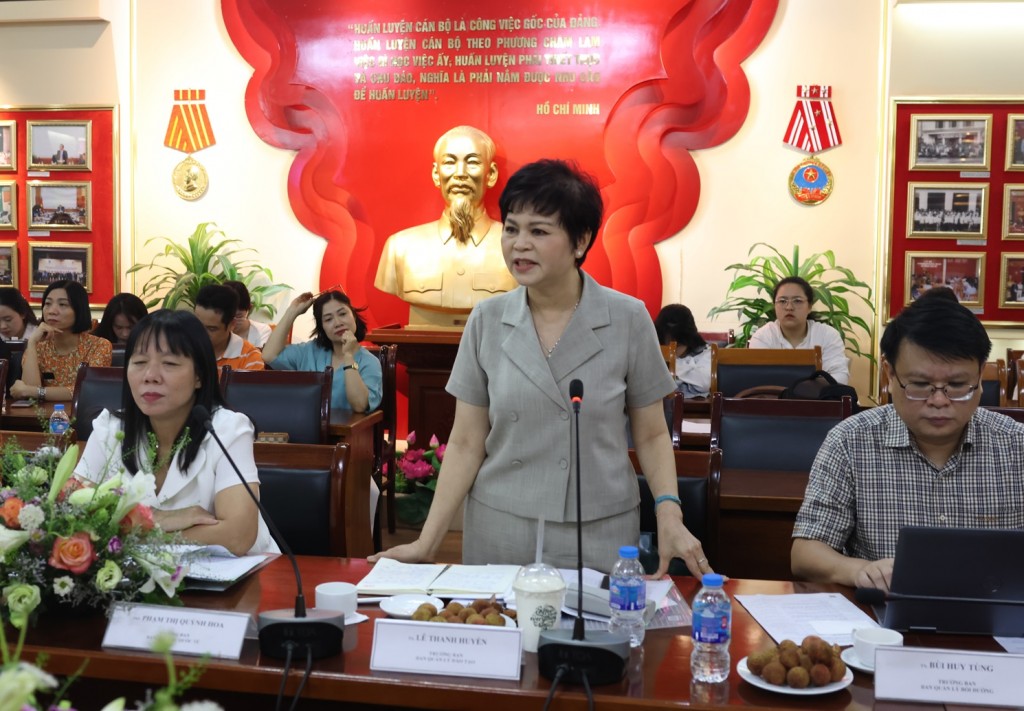
Dr. Le Thanh Huyen, Director of the Department of Graduate Training Management, NAPA, at the workshop.
Dr. Le Thanh Huyen, Director of the Department of Graduate Training Management, mentioned that the admission scores for English language students at NAPA are relatively high, indicating a solid starting point for students. Therefore, ensuring a high-quality output is crucial. The English language program has two specializations (Translation & Interpretation and English for Tourism), reflecting the NAPA’s training orientation. She highlighted several factors affecting the training quality of the English language program at NAPA, such as the training program, which needs to adhere to output standards and be adjusted every two years to keep up with practical trends; the curriculum and teaching materials; the need for experiential training programs including student exchanges with other institutions offering English language programs; application-oriented teaching methods and tools; and changes in assessment methods to allow students to experience various types of tests to achieve high scores. Additionally, the teaching methods should facilitate student interaction and practical experience.
Dr. Tran Nghi, Editor-in-Chief of the State Organization Journal, MoHA, noted that currently, Viet Nam has about 120 institutions offering bachelor’s degrees in the English language. This poses a challenge for NAPA in improving the quality of its English language training program. The Faculty of Foreign Language and Information Technology Studies at NAPA has only been offering bachelor’s degrees in the English language for three years, making it relatively young; however, this provides an advantage in learning from the experiences of older universities. Additionally, the English language program at NAPA has a unique strength compared to other universities, i.e. the advantage of training in English for public administration, human resources, and organizational management. Students gain language skills and in-depth knowledge of state management, broadening their employment opportunities after graduation.
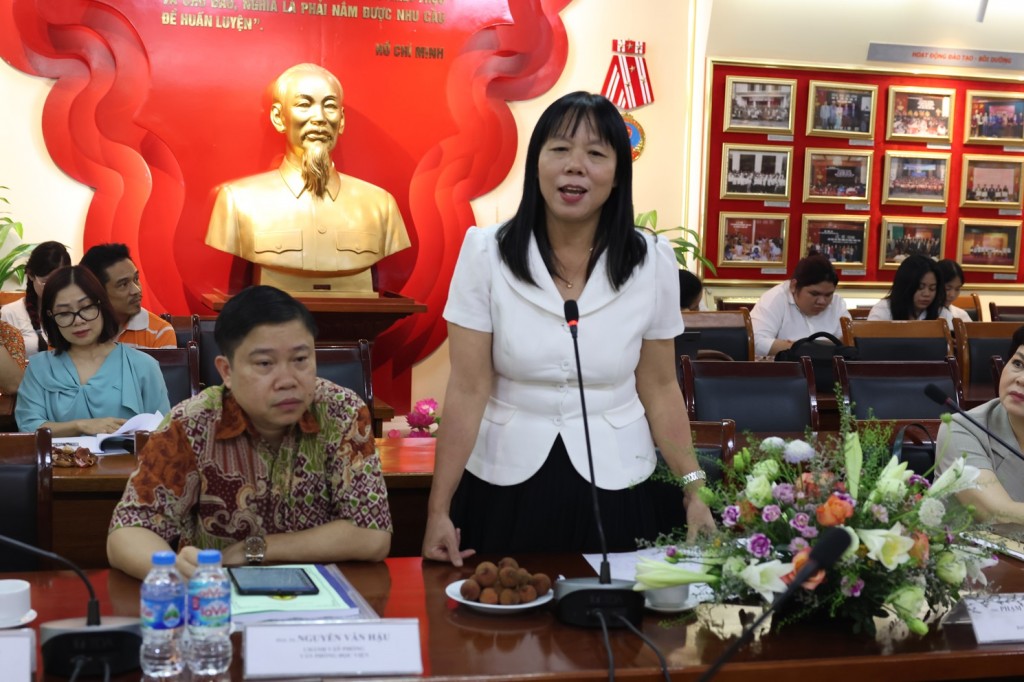
Ms. Pham Thi Quynh Hoa, Director of the Department of International Cooperation, NAPA, at the workshop.
Along with nearly 30 papers published in the proceedings, the workshop received both academic and practical contributions from the attending delegates, reflecting a diverse range of proposed solutions for improving the training quality of the English language major at NAPA.
In his closing remarks, Dr, Nguyen Dang Que, NAPA Vice President highly appreciated the responsibility, support, and cooperation of the delegates, experts, and teachers, especially those from other training institutions. With nearly 30 papers and 11 direct speeches at the workshop, the level of interest in proposing solutions to improve the training quality of the English language major at NAPA was evident. Having been offered since 2021, the English language program at NAPA was recently reorganized following the merger with Hanoi University of Home Affairs. The teaching staff is not yet numerous, and the quality is not entirely satisfactory. This is also the responsibility of the Board of Directors and the Faculty to enhance the quality of the team. The facilities for training still need to be improved. However, the NAPA Board of Directors and the leadership of the Faculty of Foreign Language and Information Technology Studies have consistently strived to improve teaching quality by encouraging, motivating, establishing partnerships, exchanging lecturers, upgrading facilities, and fostering collaborations. NAPA and the Faculty of Foreign Language and Information Technology Studies must recognize the importance of English language training, not only for employment but also to diversify training fields and uphold the NAPA’s brand responsibility to society. Consequently, solutions to improve training quality include enhancing the capacity of the teaching staff, changing students’ attitudes and motivation towards learning, upgrading facilities and teaching technology, improving materials and curricula, setting development orientations, creating a conducive learning environment, and effective management. Dr. Nguyen Dang Que suggested that the Faculty of Foreign Language and Information Technology Studies foster a working environment characterized by unity, sharing, and mutual support to achieve common development goals for the Faculty and NAPA. The faculty leadership should proactively propose and advise the NAPA leadership on developing and organizing English language training activities and creating a unique brand for the program to attract students. Faculty members should actively pursue professional development, improve teaching methods, and diversify activities to motivate students. They should also actively engage in student recruitment communication, job placement, and effective coordination with NAPA functional units in supporting training and assessment. Collaboration with international organizations, corporations, and foreign enterprises is essential for providing students with practical experiences and job opportunities. NAPA functional units should work positively with the Faculty of Foreign Language and Information Technology Studies to create favorable conditions for teaching and assessment. Dr. Nguyen Dang Que affirmed that NAPA leaders are always attentive and will have specific development strategies for the English language program, including investments in facilities and improving the learning environment, along with policies for developing the teaching staff.


